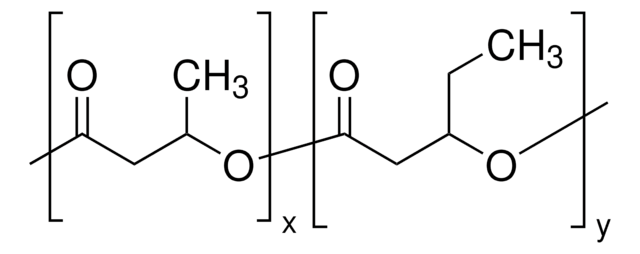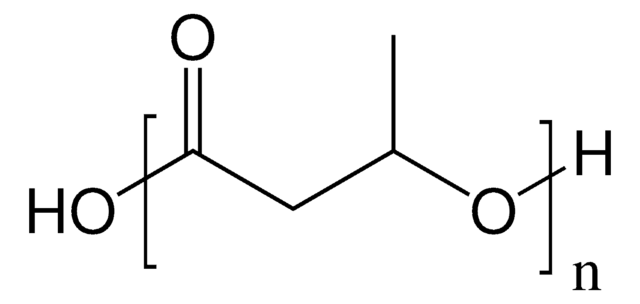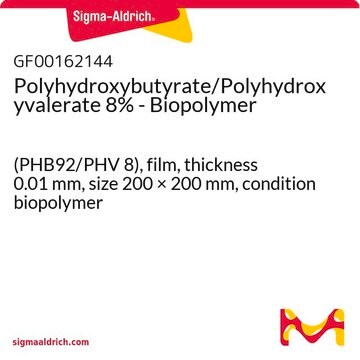916145
Poly((R)-3-hydroxybutyrate-co-(R)-3-hydroxyvalerate-co-(R)-3-hydroxyhexanoate)
natural origin, PHH content 4.1 %, PHV content 2.3 %
Synonym(s):
PHB, PHBH, PHBV, Polyhydroxybutyrate
Sign Into View Organizational & Contract Pricing
All Photos(1)
About This Item
Linear Formula:
[C4H6O2]x[C5H8O2]y[C6H10O2]z
UNSPSC Code:
12162002
NACRES:
NA.23
Recommended Products
Quality Level
form
powder
mol wt
average Mn 1,000,000
composition
3-Hydroxyhexanoic acid content, 4.1%
3-Hydroxyvaleric acid content, 2.3%
PHH content, 4.1%
PHV content, 2.3%
color
white to off-white
Related Categories
Application
Poly((R)-3-hydroxybutyrate-co-(R)-3-hydroxyvalerate-co-(R)-3-hydroxyhexanoate) is a biocompatible and biodegradable polymer produced by fermentation of genetically modified microorganisms. Poly(3-hydroxybutyric acid) (PHB) is a common polyhydroxyalkanoate (PHA), it has been widely used for food packaging, medical implants, biodegradable sutures and drug delivery systems due to its biocompatible and biodegradable properties. PHB has been investigated as drug delivery micro- and nano-carriers.
Storage Class Code
11 - Combustible Solids
WGK
WGK 3
Flash Point(F)
Not applicable
Flash Point(C)
Not applicable
Choose from one of the most recent versions:
Certificates of Analysis (COA)
Lot/Batch Number
Don't see the Right Version?
If you require a particular version, you can look up a specific certificate by the Lot or Batch number.
Already Own This Product?
Find documentation for the products that you have recently purchased in the Document Library.
Anupama Shrivastav et al.
BioMed research international, 2013, 581684-581684 (2013-08-29)
Drug delivery technology is emerging as an interdisciplinary science aimed at improving human health. The controlled delivery of pharmacologically active agents to the specific site of action at the therapeutically optimal rate and dose regimen has been a major goal
K Juni et al.
Critical reviews in therapeutic drug carrier systems, 3(3), 209-232 (1987-01-01)
Poly(hydroxy acids) so far have been examined for use in drug delivery in limited number, while the advantageous use of the polymers has been recognized due to their biodegradability and biocompatibility. Homo- and copolymers of lactic acid and glycolic acid
Sumeet Kapoor et al.
International journal of pharmaceutics, 511(2), 876-889 (2016-08-06)
Faster biodegradation, immunogenicity and lack of cell penetrative capabilities are hurdles in development of peptidyl drugs for cancer therapy. Polymeric carriers can be used to overcome these problems. The present study is focused on the use of polyhydroxybutyrate as a
Our team of scientists has experience in all areas of research including Life Science, Material Science, Chemical Synthesis, Chromatography, Analytical and many others.
Contact Technical Service![Poly[(R)-3-hydroxybutyric acid] natural origin](/deepweb/assets/sigmaaldrich/product/structures/129/476/7d1c924b-f644-4889-a2d6-d7a923ce382c/640/7d1c924b-f644-4889-a2d6-d7a923ce382c.png)







